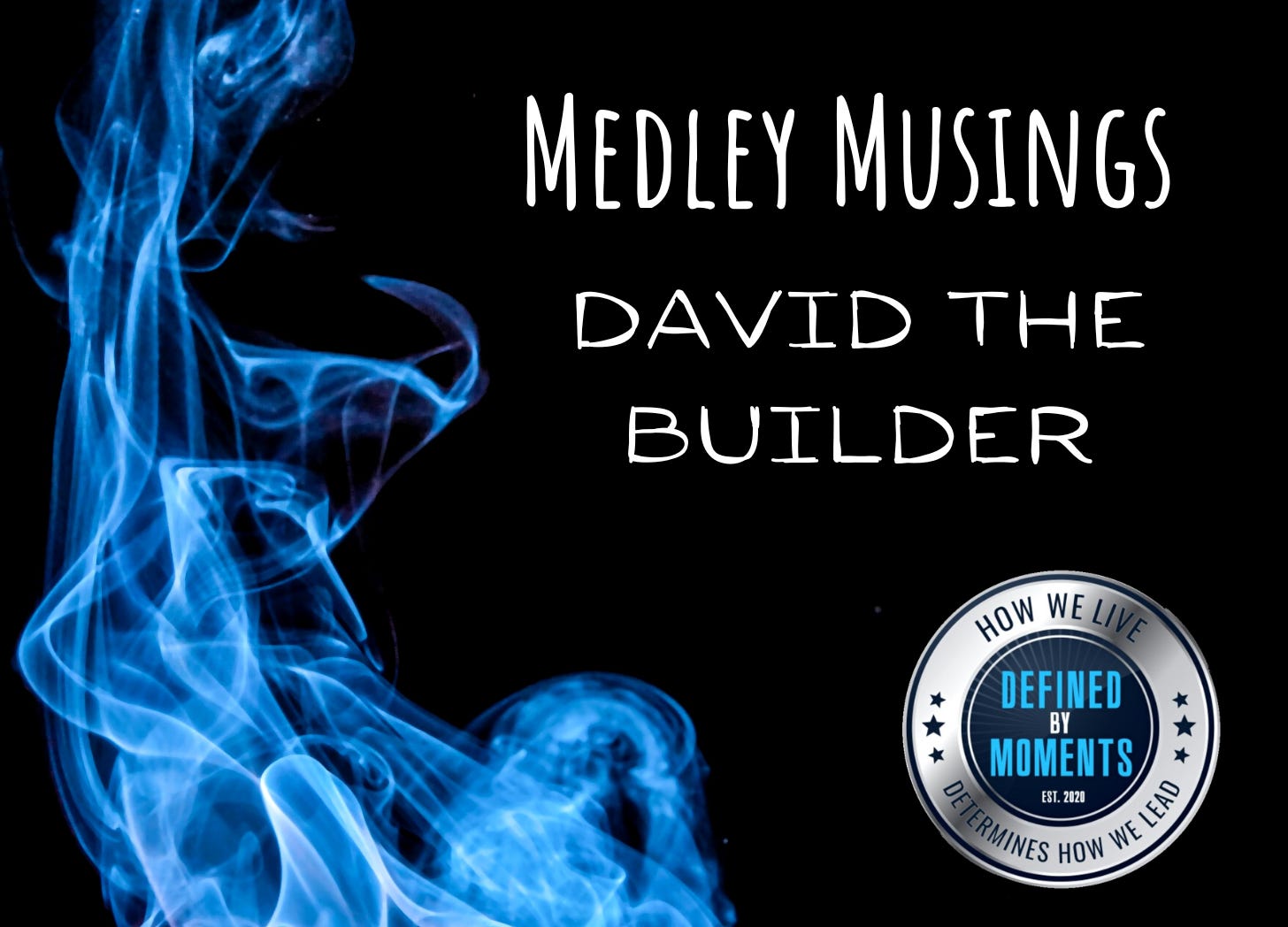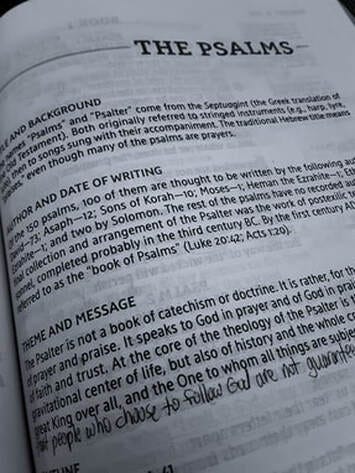DAVID THE BUILDER
So far in our Hebrew king series, we've covered three kings and are now backing up to get one that we missed.
So far in our Hebrew king series, we've covered three kings and are now backing up to get one that we missed. Presently, these are the kings that we have discussed:
Saul the Initiator (the first king who set up many protocols that other would follow);
Ishbosheth the Figurehead (the second king who was set up as Saul's son but he did not lead for long); and
Solomon the Thinker (the son of David who, initially, desired wisdom more than anything else).
If you know Biblical history, then you can spot the king that we missed - David. This blog will look at the man as how we focused on building others in life and leadership. To learn more, continue reading on...
When you hear the name "King David," what comes to mind? Stop reading and start making a list of things that come to mind. Then, let's do a quick comparison to see what we have in common:
Served as a shepherd - learning how to lead and fight
Overlooked when compared to his brothers
Known as a "man after God's own heart"
Played a musical instrument and worked for the king to help alleviate his depression
Fighter and survivor showed by the defeat of Goliath, running from Saul, and war with the Philistines
Acted as a loyal friend - see that with Saul's son Jonathan and how David looked after a crippled member of Saul's family
You could absolutely consider David a political, personal, and professional success. He did conquer the kings around Israel and brought peace to the land. He was granted the Davidic covenant by God meaning that the Messiah and future King of Kings would be part of his dynasty. With these wonderful successes, David also experienced catastrophic failures. He was an adulterer with Bathsheba, a murderer by having Urijah killed to cover the adultery, and a boaster in numbering the people to see all that he accomplished. In each sin, David's choices cost other people dearly. This example is a life lesson for us - while you make a bad choice, you do not get to choose its consequence.
David, in being crowned king, needed to unite the nation. We can trace what he did in 2 Samuel 2, 3, and 4 where Saul's last remaining son had a short reign as I mention in this blog entry. David then forged alliances because of his tremendous reputation and his armies in battle (see 2 Samuel 5 for a description of Hiram the King of Tyre). With battles being won and nations leaving Israel alone, he wanted to create a place for God - the Temple - to make it central for all of Israel (see 2 Samuel 7).
The most important part of David as an example about being a "Builder" in both life and leadership takes us to the book of Psalms. He authored the longest book of the Bible that includes the longest chapter of the Bible. These "poems of praise" are a treasure trove of information for us in that they reveal the gold that can be unearthed by thinking time. David pondered the wonder of the world and then wrote about it (something we should also do). David took his experience and evaluated it so that he could learn (ahem...something we should also do). David even recorded his confessions and how they led to personal change. The Psalms is an intensely personal book - a glimpse into his heart and mind - that really shows us who he was as a person. It is clear that how he lead came from how he lived.
David, as a Builder, teaches us 3 important lessons:
God is in every moment of life - if you are looking for Him. Please make sure you read that statement carefully. Those words are NOT saying that God is in everything, which is pantheism, but they do reveal how frequently we miss God at work because we are "too busy" to slow down. When an unexpected blessing comes, God is there. When difficulty hits us hard, God is there. When we are suffering the consequences of our poor decisions, God is there. The key is that we have to look for Him and His presence. Grab your Bible and go to Psalm 104. Take note of all the natural elements that David mentions - grass growing for livestock, trees being watered, the cycle of the sun and moon, and even the depths of the sea. These comments are not mere words on a page but are ponderings of his heart. David was looking at each of these circumstances and noting how God was involved in them. He begins and ends this psalm with "Bless the Lord, O my soul!" How could he say that? Because he intentionally looked for God in every facet of life. What he discovered caused him to worship the greatness, splendor, and majesty of the Lord. The question for you is an easy one: did you, in our world, see God today?
Your plan may not meet His purpose. David and his desire to build the Temple has taught us this lesson clearly, yet, he writes about it in his "poems of praise." Look up Psalm 33:11 to see that God's plans stand firm and His purposes stem from His heart. That one verse shows us that our plans are completely like His - ours change regularly because we are not established as He is. Flip over to Psalm 32:8 as this gives us comfort and encouragement that God will instruct, teach, and counsel us in the right way. In other words, when our plans conflict with God's, we need to bend our desires and passions to His purpose. One of the best "church signs" I've ever seen said this - make your plans in pencil and give God the eraser. There are so many other verses that we could consider but we do not have the time to do so. Those that follow are just a short list of some others in Psalms that speak about God's purpose: Psalm 37:23-24, Psalm 138:8, Psalm 139:16.
Living your learned lessons leads to a lasting legacy. This may be the culminating lesson of David, but it cannot be separated completely from the prior two. David's poems or songs are filled with Him seeing God everywhere in life just as much as they are filled with him seeing God's plan revealed. Where David offers us a shining example is within the actual thought process and writing. He put his faults and failures out there for the world to see within what some call the "psalms of confession." If you want to read them, here they are: Psalm 6, 32, 51, 102, 130, and 143. Let's briefly focus on the last one in that list as David opens Psalm 143 begging for the Lord to hear him. He then reflects on all that God has done in the past (see #1 above) and turns to his choice of trusting in God's purpose and plan (see #2 above). David has learned to seek God in every aspect of life and, as such, can see God in every aspect of life.
As a person and leader, how are you building others? I'm not just talking about the here and now but want you to think long-term. How are you going to leave a lasting legacy? The answer is astoundingly simple - writing. Purchase a journal and write so that your spouse or children will have a collection of your thoughts after you are gone. Create a blog and write for the world at large to learn from you. Record podcasts that share the lessons you have learned with others. If you want to build others, it is going to take time and effort but - more than anything else - it requires the right relationship with God.
Your responsibility to the next generation is to help them see the truth by hearing the truth; so, how well do you see and hear the truth daily?



